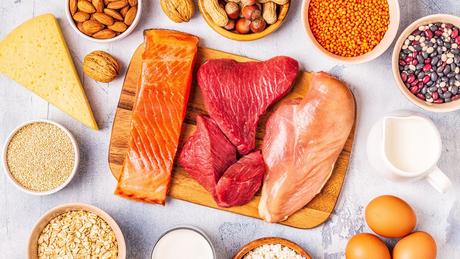You may have seen the new marketing in the grocery store. Every product now seems to be "a great source of protein." Higher protein diets are in the news and all over social media.
With all the hype, you might be wondering, "What's so special about protein?"
It's not just hype. Protein really is important. Following the most current research, Diet Doctor has expanded its recommendations to include higher protein diets, along with varying degrees of carbohydrate reduction, as a healthy way to lose weight and improve many health conditions.
In this guide, you'll learn why protein is so important. Protein plays two critical roles in good health you may not know about: protein regulates appetite for weight management and provides the building materials for strong bones.
Strong bones and a manageable appetite are important for everyone, but especially for individuals who are trying to lose weight or improve their health. Increasing your protein intake when you are trying to lose weight can ensure you maintain good health - and it can even make weight loss easier.
Get your personalized meal plan with a FREE 30-day trial!
1. What does protein do?
The food we eat has two primary purposes:
- to provide us with energy to run our bodies and live our lives, and
- to create the structural and functional elements that make up our bodies.
The carbohydrates and fats in food provide most of our energy for the first purpose.
Protein is different. Protein is an inefficient energy source for the body. But it is essential for the body's structure and function. These include obvious things - such as muscle tissue - and include less obvious components, such as enzymes, hormones, and bone.
Nearly half the protein in your body is skeletal muscle, and protein is the most important nutrient for maintaining and building it. Evidence indicates most people would improve their lean muscle mass by making sure they have adequate protein intake.
For people who want to add muscle, getting enough protein is a must. Athletes who are breaking down and rebuilding muscle need more dietary protein to aid in this process. If you are interested in building muscle mass, check out Diet Doctor's guide to improving your body composition for more on this topic.
Even if you're not interested in building muscle, you'll want to maintain the muscle you have for general good health. An important part of doing that is making sure you get enough protein.
How much protein do you need for good health?
How much protein you need depends on several factors, such as how tall you are or whether you are male or female. You can use this chart to estimate your daily protein requirements.
High-protein diet minimum daily targets
Aim for approximately this much protein every day.If you are older, very active, trying to lose weight, or have a metabolic condition, such as diabetes, you may want to increase your protein target by around 20 to 30 grams more per day.
2. Protein for better weight loss

Research shows a diet higher in protein leads to greater weight loss compared to one with lower protein levels.
Protein has positive effects on two things important for weight loss:
- maintaining muscle and bone mass, and
- taming appetite.
Protein, muscle, and metabolism
Although weight loss can improve many aspects of health, it can have at least one detrimental effect. Weight loss, especially repeated cycles of weight loss, can lead to loss of muscle mass.
Part of healthy weight loss is maintaining as much of your fat-free mass as possible while losing excess body fat. Your fat-free mass includes muscle and bone; both can be negatively impacted by weight loss.
Loss of muscle mass can not only impact not only lead to loss of bone mass, it can also lead to a slower metabolism. When you have a slower metabolism, your body burns fewer calories. So when you lose muscle mass, you need to eat even less in order to continue to burn body fat. In contrast, keeping your muscle mass during weight loss means you'll use more energy than you would if muscle mass were reduced, even when you're resting.
3. Protein for better bone health

Although the relationship between protein and muscle seems clear, many people don't know protein is also essential for bone health. This is true in general but is particularly critical during weight loss and especially important for older adults.
Women, especially older women, are at particular risk of bone loss. But men also suffer from bone loss and are at higher risk of dying after a bone fracture takes place.
We've all heard calcium and vitamin D are important for maintaining strong bones. Many tasty supplements on the market provide these nutrients, and people at risk for osteoporosis may take them faithfully. But the US Preventive Services task force found little evidence these supplements prevented fractures, which is the primary goal of improving bone health.
The role of protein in bone health is less well known, but just as - or even more - important. Protein supplies the amino acids needed to make the collagen that makes up the bone matrix. It is estimated that protein makes up about 50% of the volume of bone and about one-third of its mass.
No randomized controlled trials have been done looking at the effects of protein intake on preventing bone fractures. However, an important marker of bone strength - bone mineral density - is linked to increased dietary protein.
Older adults and bone health
Older adults in particular may need more protein to support good health, promote recovery from illness, and maintain functionality, particularly when it comes to maintaining strong bones.
In the past, experts thought increased protein could harm bones because higher protein diets seemed to result in higher calcium levels in the participants' urine. But with more advanced techniques, researchers found dietary protein helps increase absorption of dietary calcium, so there is more calcium available for bone-building and more left to be excreted.
So far, no quality evidence has been found to indicate increased protein damages bones. On the contrary, older adults, who are at the greatest risk for bone loss, need to make sure they get enough protein.
Older adults tend to eat fewer calories overall, and this can mean they also eat less protein. Older women, especially, may not meet even the low intake levels of the Recommended Daily Allowance (RDA).
The RDA for protein is 0.8 grams per kilo of reference body weight. But, as we explain in this guide to higher protein diets, this amount is likely too low for most people who want to improve their health.
Because older adults do not metabolize protein as well as younger people, researchers believe if you are over 65 years of age, you need a protein intake at least 35% higher than what the RDA recommends to preserve lean body mass and maintain bone health.
These higher targets translate to an intake of at least 1.0 gram per kilo of reference body weight. At Diet Doctor, we recommend slightly higher intakes for promoting overall good health, especially during weight loss. See the simple chart above to find out how much protein you should aim for on most days.
Meal plans designed for results
With our personalized meal plans, we do the planning for you. All you have to focus on is cooking, eating, and enjoying healthy, delicious food.

Weight loss and bone health
In the past, experts thought obesity would protect bone health. The tension skeletal muscles put on the bones they are attached to helps stimulate bone growth. More bodyweight often means more muscle, which usually means stronger bones.
But this is not the whole picture.
If muscle mass has been reduced - maybe by multiple rounds of weight loss, especially with very low-calorie restriction - a person who is overweight or obese may also have a condition called sarcopenic obesity, which is having both low muscle mass and obesity.
Additionally, the hormonal and inflammatory aspects of obesity can undermine bone health. Both obesity and calorie-restricted diets for weight loss are associated with an increased risk of fracture.
This seems to create an impossible bind. If both losing weight and being overweight are bad for bone health, what can you do? The answer may be a higher protein diet for weight loss.
Ensuring you get plenty of protein may help protect your bones during weight loss. Adding weight-bearing exercise to the mix makes it even more likely you'll reduce the bone loss that can occur while dieting.
However, higher protein diets can help with weight loss in other ways, besides just protecting bone health. The effects of protein on appetite are also important for taming the hunger that can derail any diet.
4. Protein and appetite

Different people may find different types of food filling. However, research shows, calorie for calorie, protein foods - along with high-fiber vegetables - are the best foods for helping your body feel full.
Since hunger is a primary reason people are unable to stick to diets, a dietary approach that reduces hunger may lead to increased weight loss and long-term success. In fact, getting adequate protein may be built into the human body in a way that makes it difficult to maintain a healthy weight if protein intake is too low.
Protein leverage hypothesis
A concept called the protein leverage hypothesis argues all creatures, from insects to humans, are driven to eat until they fulfill their need for protein. This isn't a problem if the available food sources have a high protein percentage, which means a high amount of protein per calorie.
When you choose foods with a high protein percentage, you are more likely to eat fewer calories than you would otherwise. Your protein needs will be met quickly, without having to take in a lot of calories from fat or carbohydrate. Foods with a high protein percentage are things like fish and seafood, chicken breast, and lean meats.
Choosing these foods means getting the most protein with the fewest calories.
But the reverse is true as well.
If you choose foods with a low amount of protein per calorie, you might be much more likely to continue to eat until your protein needs are met. Foods like pasta, cereal, or bread have low amounts of protein per calorie compared to foods like meat and eggs.
A diet made up mostly of foods with a low protein percentage may result in either not enough protein or too many calories. Not enough protein can lead to loss of muscle and bone. Too many calories can lead to weight gain.
Choosing foods with a high protein percentage helps you reach your protein goals without eating too many calories, which can help with weight loss.
But, the implications of the protein leverage theory go beyond a focus on higher protein foods for weight loss. The theory also gives us a different perspective on willpower and what it takes to lose weight.

5. Protein, willpower, and self-blame
Clinicians who work with people trying to lose weight sometimes encounter patients who feel as if they just can't stop eating. This can happen on many kinds of diets. Despite following their diet all day, in the evening, the ice cream in the freezer calls to them irresistibly.
At some point in our lives, many of us have felt an urge to eat even when we "know" we've had plenty of calories for the day. We may attribute this urge to a "craving" or "lack of willpower."
But could it be a lack of protein instead?The protein leverage theory suggests - and research, along with clinical experience, confirms - increasing protein intake at the first meal of the day, whenever that occurs, can stop evening cravings and urges to eat, without having to call on "willpower."
Researchers have found most Americans eat sufficient protein at lunch and more than enough at dinner, with most people eating very low protein at breakfast - or none at all. This pattern alone could be an indication of protein leverage at work, as the body tries to meet its protein needs before the overnight fast.
Several studies show when participants are given a high-protein meal at the start of their day, cravings, snacking, and overall energy intake go down.
For example, when study participants consumed eggs for breakfast, rather than a bagel with the same number of calories but lower in protein, they ate fewer calories over the course of the day, without any other modification to their diet.
Other studies indicate, in a population of young overweight or obese women, a higher protein breakfast leads to increased fullness, reduced appetite, and fewer cravings compared to skipping breakfast. The participants who ate a higher-protein breakfast snacked less on high-fat and high-sugar treats in the evenings.
No matter when your "breakfast" is - early morning or in the afternoon - the evidence suggests it is important to do two things:
- Make sure your "first meal" of the day has at least 25 grams of protein.
- Get sufficient protein during the day to meet your protein needs.
Depending on your health goals, you may want to meet your protein needs with lower calorie foods or with higher fat foods. But if you are trying to lose weight, plenty of protein with just enough calories may be the ticket to success.

Get your personalized meal plan with a FREE 30-day trial!
What's your main health goal?
Decreasing protein percentage and rise in obesity
Our bodies are driven to get sufficient protein. But, we've been told it is "healthier" to eat foods - pasta, rice, and bread - with a low protein percentage. And we've been told to limit or avoid foods - eggs and meat - with a higher protein percentage.
During the rising rates of obesity of the past four decades, calories in the food supply have increased, yet the percentage of calories from protein has decreased.
Because both calorie and carbohydrate intake went up in the past 40 years, it's been difficult to tease apart which one might be the reason for increased rates of obesity.
But perhaps we could think about this differently: Maybe it's not so much what we were eating, but what we weren't eating that has led to this worldwide weight gain. Maybe focusing on meeting protein needs is the key to preventing overweight and obesity in the first place.
6. Why protein is important
Protein is not like carbohydrates and fats, which are primarily just sources of energy. Protein is necessary for the body to function. It is also necessary for building the structures that make up the body, such as bone and muscle.
If you are an older adult, you need to pay special attention to protein intake. Older adults, especially women, need more protein - to preserve bone and muscle - but tend to eat less of it.
Protein is also important during weight loss, again to preserve bone and muscle. Maintaining muscle mass keeps your metabolism burning energy, making weight loss more effective and easier to maintain.
Finally, protein helps you manage your appetite and your cravings. You can give your "willpower" a boost by ensuring you get adequate protein every day, starting with your first meal.

